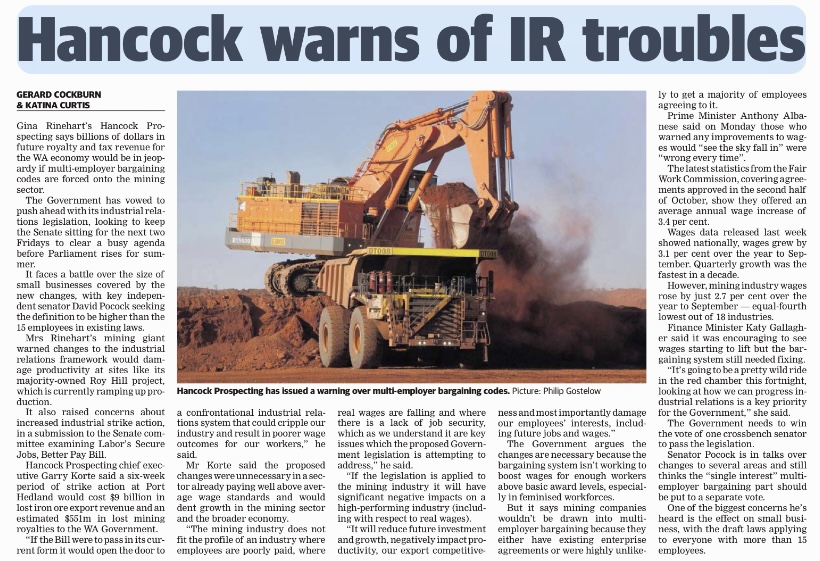
Article by Gerard Cockburn and Katina Curtis courtesy of the North West Telegraph.

Gina Rinehart’s Hancock Prospecting says billions of dollars in future royalty and tax revenue for the WA economy would be in jeopardy if multi-employer bargaining codes are forced onto the mining sector.
The Government has vowed to push ahead with its industrial relations legislation, looking to keep the Senate sitting for the next two Fridays to clear a busy agenda before Parliament rises for summer.
It faces a battle over the size of small businesses covered by the new changes, with key independent senator David Pocock seeking the definition to be higher than the 15 employees in existing laws. Mrs Rinehart’s mining giant warned changes to the industrial relations framework would damage productivity at sites like its majority-owned Roy Hill project, which is currently ramping up production.
It also raised concerns about increased industrial strike action, in a submission to the Senate committee examining Labor’s Secure Jobs, Better Pay Bill.
Hancock Prospecting chief executive Garry Korte said a six-week period of strike action at Port Hedland would cost $9 billion in lost iron ore export revenue and an estimated $551m in lost mining royalties to the WA Government. “If the Bill were to pass in its current form it would open the door to a confrontational industrial relations system that could cripple our industry and result in poorer wage outcomes for our workers,” he said.
Mr Korte said the proposed changes were unnecessary in a sector already paying well above average wage standards and would dent growth in the mining sector and the broader economy.
“The mining industry does not fit the profile of an industry where employees are poorly paid, where real wages are falling and where there is a lack of job security, which as we understand it are key issues which the proposed Government legislation is attempting to address,” he said.
“If the legislation is applied to the mining industry it will have significant negative impacts on a high-performing industry (including with respect to real wages).
“It will reduce future investment and growth, negatively impact productivity , our export competitiveness and most importantly damage our employees’ interests, including future jobs and wages.”
The Government argues the changes are necessary because the bargaining system isn’t working to boost wages for enough workers above basic award levels, especially in feminised workforces.
But it says mining companies wouldn’t be drawn into multiemployer bargaining because they either have existing enterprise agreements or were highly unlikely to get a majority of employees agreeing to it.
Prime Minister Anthony Albanese said on Monday those who warned any improvements to wages would “see the sky fall in” were “wrong every time .
The latest statistics from the Fair Work Commission, covering agreements approved in the second half of October, show they offered an average annual wage increase of 3.4 per cent.
Wages data released last week showed nationally, wages grew by 3.1 per cent over the year to September.
Quarterly growth was the fastest in a decade. However, mining industry wages rose by just 2.7 per cent over the year to September — equal-fourth lowest out of 18 industries.
Finance Minister Katy Gallagher said it was encouraging to see wages starting to lift but the bargaining system still needed fixing.
“It’s going to be a pretty wild ride in the red chamber this fortnight, looking at how we can progress industrial relations is a key priority for the Government,” she said.
The Government needs to win the vote of one crossbench senator to pass the legislation. Senator Pocock is in talks over changes to several areas and still thinks the “single interest” multiemployer bargaining part should be put to a separate vote.
One of the biggest concerns he’s heard is the effect on small business , with the draft laws applying to everyone with more than 15 employees.















